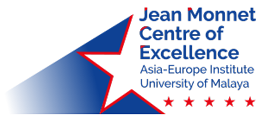
24/5/2020
REPORT ON JEAN MONNET CENTRE OF EXCELLENCE AMBASSADOR LECTURE SERIES 2020
Presented by H.E. Dr. Ivan Velimir Starčević, Ambassador of the Republic of Croatia to Malaysia
On the 22nd of May 2020, Asia-Europe Institute (AEI) hosted H.E. Dr. Ivan Velimir Starčević, Ambassador of the Republic of Croatia to Malaysia, who delivered a lecture entitled “The Croatian Presidency of the Council of the European Union, January 1st – June 30th, 2020.” The lecture was part of the institute’s ongoing Jean Monnet Centre of Excellence Ambassador Lecture Series 2020. Due to Covid-19 restrictions, it was broadcasted on the AEI YouTube page.
The Presidency of the Council of the European Union rotates among EU member states in intervals of 6 months. For the first half of 2020, it was held by Croatia – its first presidency since the nation’s accession to the EU in 2013. In his lecture, H.E. first outlined the four priorities of the Croatian government for its tenure, under the motto, “a strong Europe in a world of challenges”: (1) A Europe that develops, (2) A Europe that connects, (3) A Europe that protects, and (4) An influential Europe.
He remarked that the most pressing item on the Croatian presidency at the time was the Covid-19 pandemic. It greatly influenced the implementation of the previously planned initiatives and impacted the presidency in substance and form. He commended the EU for being quick to adapt by developing online methods to meet based on video conferencing tools to ensure the continuing function of the Union.
This allowed the European Council to meet via video conferencing to unveil the joint European road map towards lifting the containment measures on April 23rd which included financial stimulus for workers, businesses and member states, amounting to 540 billion euros. The Croatian presidency also facilitated the establishment of a recovery fund to target selected sectors throughout Europe impacted by the pandemic. To that end, the European Commission was tasked with developing a proposal to raise funds in capital markets as well as link it with the EU’s 2021-2027 Multiannual Financial Framework. The European Parliament voted in favour of the resolution and expressed its position for the fund to be at least 2 trillion euros in size.
The pandemic, however, does not mean the cessation of the Croatian presidency’s goals. H.E. hailed the successes of repatriating tens of thousands of EU citizens of various countries around the world. He also pointed to the conference on the future of Europe – a project to give Europeans a greater say on the workings of the EU – as well as the Green Deal which sought to make Europe climate-neutral in 2050 as crucial milestones to achieve besides battling the ongoing pandemic.
Not to be disregarded, is the continuation of the EU’s enlargement progress to provide a route to membership for Western Balkans countries. He lauded the start of negotiations with Albania and North Macedonia which occurred in the tenure of the Croatian presidency as a big step forward for the EU – reflective of Croatia’s commitment to the enlargement of the Union.
On EU-ASEAN relations, H.E. voiced the Croatian presidency’s aspirations for greater connectivity between both regions while emphasising the continued will to improve political, economic and security relations of the EU with Asia. In light of the ongoing pandemic, he also alluded to the changes to dynamics of this partnership as a consequence. As such, he referred to the Asia-Europe Conference on Sustainable Connectivity held in Singapore in September 2020, as the ideal platform to discuss ideas on inter-regional connectivity.
H.E. also further reiterated Croatia’s sustained contribution to the developments of EU-ASEAN relations. He noted positive milestones including a donation by the EU of 350 million euros to stem the pandemic which was announced during the first virtual EU-ASEAN Meeting on the pandemic as well as Croatia’s involvement as regional coordinator during its Presidency for the 13th Asia-Europe Meeting (ASEM) Summit.
The lecture ended with a reflection of the Croatia’s inaugural presidency of the Council of EU, marked by two significant aspects. The first, being Brexit, which took place formally on the 31st of January 2020 and is reshaping the future of EU-UK relations. Next, is the Covid-19 pandemic that caught everyone by surprise and forced the world to adjust to new circumstances. H.E. added that he was positive that the Croatian presidency will go down in history as the presidency of resilience in conditions of Covid-19 pandemic. He also reiterated Croatia’s determined work to the enlargement of the EU and hailed the start of accession negotiations with North Macedonia and Albania as well as the EU-Western-Balkan Zagreb Summit on May 6th as flagship achievements of the Croatian presidency which will remain its lasting legacy.
Last Update: 15/12/2021